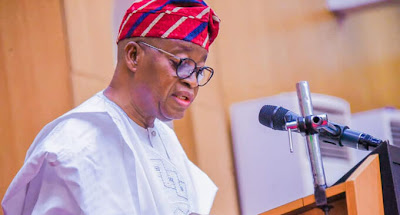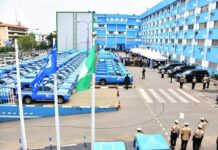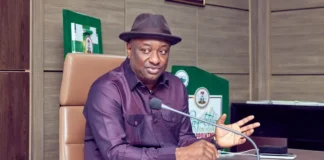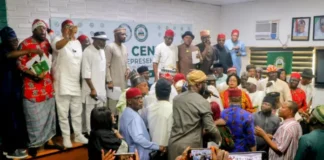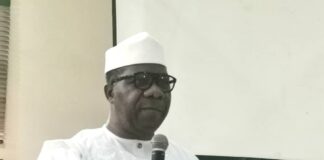The ministry had mapped out workable strategies in formulating a comprehensive policy and roadmap to harness Nigeria’s maritime and ocean resources for sustainable economic growth and development
Adegboyega Oyetola, the Marine and Blue Economy Minister, on Tuesday, unveiled his ministry’s plan to generate $20 billion and create two million jobs annually.
He said the goal would be achieved through strategic development within the maritime sector.
Oyotola also disclosed a four-year plan to transform the Marine and Blue Economy sector into a significant contributor to the nation’s economy, to compete with the oil and gas sector in Gross Domestic Product (GDP) contribution.
The minister, who dropped the hints yesterday at the 2023 Investment Summit and Expo in Abuja, said his ministry has a goal to redefine the marine and blue economy sector for sustainable national socio-economic growth and development.
Represented by his technical aide, Prof. Busayo Fakinlede, the minister said efforts were ongoing on the expansion and optimisation of the ports, infrastructure refurbishment, deep-sea ports development and the streamlining of operations through policies, like online clearing and National Single Window.
According to him, the newly created ministry had mapped out workable strategies in formulating a comprehensive policy and roadmap to harness Nigeria’s maritime and ocean resources for sustainable economic growth and development.
Oyetola a Stakeholders’ Roundtable would soon be organised as a platform for engaging with key players in the marine and blue economy sector.
He said: “In Nigeria, experts have noted that the untapped potential within the Marine and Blue Economy sector is estimated to be a staggering $296 billion.
“Recognising this immense opportunity, we are committed to driving forward with policies and initiatives aimed to unlock this latent value.
“Our ambitious goal is to generate up to $20 billion annually and create about two million jobs on an annual basis through strategic development within this sector.
“We aspire for the Marine and Blue Economy to become a substantial contributor to our nation’s economy, with a target to at least match the GDP contribution of the oil and gas sector within the next four years.”
Oyetola noted that the ministry has been strategically balancing the fortification of existing strengths with the exploration of new avenues for growth within the marine and blue economy.
He said: “As we work towards completing key port projects like Ibom, Badagry, Ondo, Snake Island, Bonny, Burutu Sea Ports, the Funtua Dry Port, Lokoja River Port, and Jos Inland Dry Port, we anticipate the creation of new economic hubs, increased employment opportunities, and improved goods movement, all of which will contribute significantly to our nation’s growth and development.
“Our commitment to the development of inland waterways is unwavering. We aim to link all regions of the country through our inland waterways by exploring PPP arrangements that would facilitate the attraction of Foreign Direct Investment (FDI) to the inland waterways.”
He said the government was considering the re-establishment of a National Shipping Line, through a strategic PPP arrangement.
The minister explained that the move was aimed at capturing a substantial share of the estimated $10 billion annual ship charter market within the country.
Oyetola said: “It is important to note that this initiative will not seek to impede the growth of local players but rather to provide an avenue for them to create and extract more value from the sector, especially through ship construction, maintenance, and repairs.
“We will support indigenous ship owners through the Cabotage Fund to acquire more vessels. This would enable our local businesses to better leverage the Cabotage Act, which gives Nigerians the exclusive right to control locally-generated seaborne trade.”

